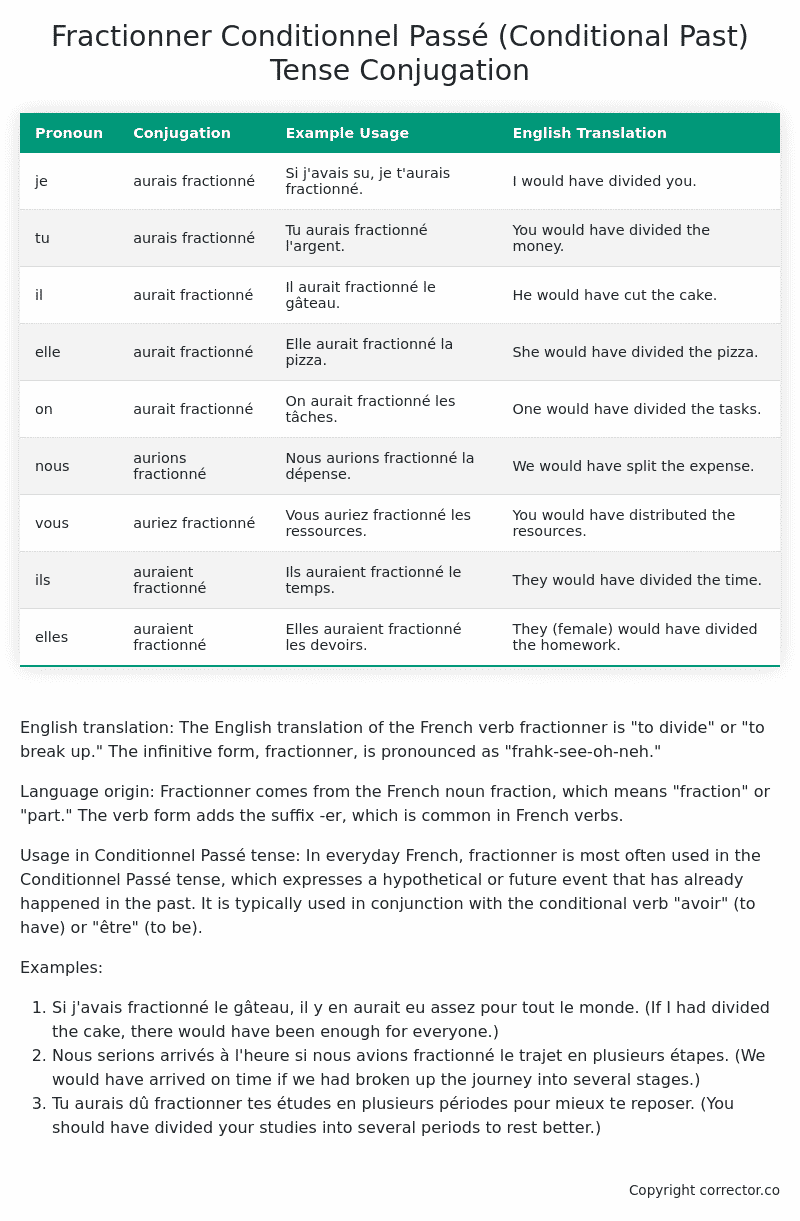Conditionnel Passé (Conditional Past) Tense Conjugation of the French Verb fractionner
Introduction to the verb fractionner
English translation: The English translation of the French verb fractionner is “to divide” or “to break up.” The infinitive form, fractionner, is pronounced as “frahk-see-oh-neh.”
Language origin: Fractionner comes from the French noun fraction, which means “fraction” or “part.” The verb form adds the suffix -er, which is common in French verbs.
Usage in Conditionnel Passé tense: In everyday French, fractionner is most often used in the Conditionnel Passé tense, which expresses a hypothetical or future event that has already happened in the past. It is typically used in conjunction with the conditional verb “avoir” (to have) or “être” (to be).
Examples:
- Si j’avais fractionné le gâteau, il y en aurait eu assez pour tout le monde. (If I had divided the cake, there would have been enough for everyone.)
- Nous serions arrivés à l’heure si nous avions fractionné le trajet en plusieurs étapes. (We would have arrived on time if we had broken up the journey into several stages.)
- Tu aurais dû fractionner tes études en plusieurs périodes pour mieux te reposer. (You should have divided your studies into several periods to rest better.)
Table of the Conditionnel Passé (Conditional Past) Tense Conjugation of fractionner
| Pronoun | Conjugation | Example Usage | English Translation |
|---|---|---|---|
| je | aurais fractionné | Si j’avais su, je t’aurais fractionné. | I would have divided you. |
| tu | aurais fractionné | Tu aurais fractionné l’argent. | You would have divided the money. |
| il | aurait fractionné | Il aurait fractionné le gâteau. | He would have cut the cake. |
| elle | aurait fractionné | Elle aurait fractionné la pizza. | She would have divided the pizza. |
| on | aurait fractionné | On aurait fractionné les tâches. | One would have divided the tasks. |
| nous | aurions fractionné | Nous aurions fractionné la dépense. | We would have split the expense. |
| vous | auriez fractionné | Vous auriez fractionné les ressources. | You would have distributed the resources. |
| ils | auraient fractionné | Ils auraient fractionné le temps. | They would have divided the time. |
| elles | auraient fractionné | Elles auraient fractionné les devoirs. | They (female) would have divided the homework. |
Other Conjugations for Fractionner.
Le Present (Present Tense) Conjugation of the French Verb fractionner
Imparfait (Imperfect) Tense Conjugation of the French Verb fractionner
Passé Simple (Simple Past) Tense Conjugation of the French Verb fractionner
Passé Composé (Present Perfect) Tense Conjugation of the French Verb fractionner
Futur Simple (Simple Future) Tense Conjugation of the French Verb fractionner
Futur Proche (Near Future) Tense Conjugation of the French Verb fractionner
Plus-que-parfait (Pluperfect) Tense Conjugation of the French Verb fractionner
Passé Antérieur (Past Anterior) Tense Conjugation of the French Verb fractionner
Futur Antérieur (Future Anterior) Tense Conjugation of the French Verb fractionner
Subjonctif Présent (Subjunctive Present) Tense Conjugation of the French Verb fractionner
Subjonctif Passé (Subjunctive Past) Tense Conjugation of the French Verb fractionner
Subjonctif Imparfait (Subjunctive Imperfect) Tense Conjugation of the French Verb fractionner
Conditionnel Présent (Conditional Present) Tense Conjugation of the French Verb fractionner
Conditionnel Passé (Conditional Past) Tense Conjugation of the French Verb fractionner (this article)
L’impératif Présent (Imperative Present) Tense Conjugation of the French Verb fractionner
L’infinitif Présent (Infinitive Present) Tense Conjugation of the French Verb fractionner
Struggling with French verbs or the language in general? Why not use our free French Grammar Checker – no registration required!
Get a FREE Download Study Sheet of this Conjugation 🔥
Simply right click the image below, click “save image” and get your free reference for the fractionner Conditionnel Passé tense conjugation!

Fractionner – About the French Conditionnel Passé (Conditional Past) Tense
Formation
Common Everyday Usage Patterns
Expressing Unreal Past Scenarios
Polite Requests or Suggestions
Expressing Doubt or Uncertainty
Interactions with Other Tenses
Conditional Present
Indicative Past Tenses
Conditional Future
Summary
Want More?
I hope you enjoyed this article on the verb fractionner. Still in a learning mood? Check out another TOTALLY random French verb conjugation!


